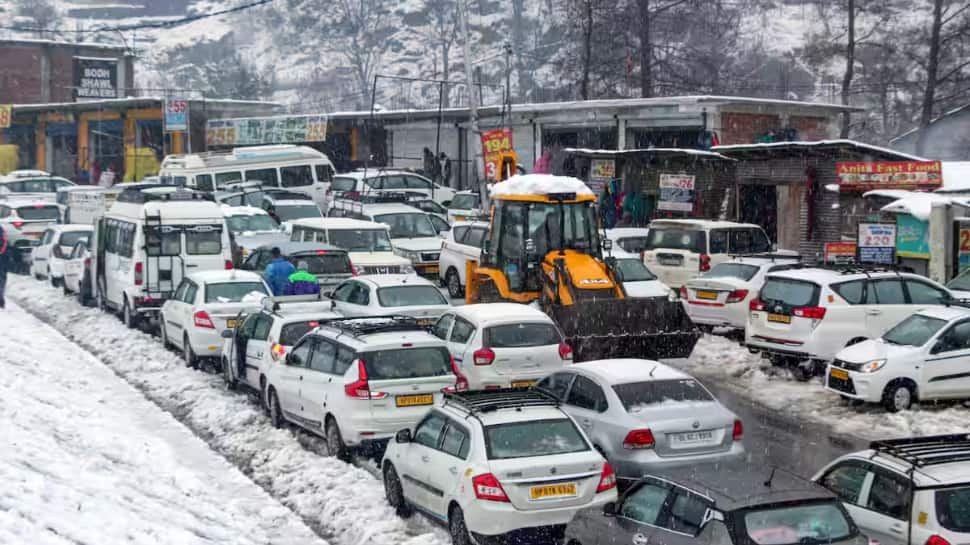 |
|
The recent heavy snowfall in Kashmir, the first major event of the season, caused significant disruptions to transportation and connectivity within the region. The Srinagar International Airport, a crucial gateway to the Valley, was temporarily closed, grounding all flights and stranding numerous travelers. The closure of the Jammu-Srinagar national highway, a vital artery connecting the Kashmir Valley to the rest of India, further exacerbated the situation. The highway’s closure, along with the suspension of train services, effectively isolated the region for a brief period. This disruption underscored the critical role that these transportation links play in the everyday lives of Kashmiris and the smooth functioning of the region's economy.
However, swift action by authorities ensured a relatively quick restoration of normalcy. The Airports Authority of India (AAI) worked diligently to clear the airport runways and restore flight operations. Within a day, flights resumed, providing much-needed relief to stranded passengers and allowing travel to and from the region to resume. Simultaneously, efforts were focused on reopening the Jammu-Srinagar highway. While the highway was reopened relatively quickly, authorities cautioned motorists about the treacherous road conditions, particularly on the Banihal-Qazigund stretch, known for its challenging terrain and susceptibility to ice accumulation. This necessitated a careful and controlled reopening, prioritizing safety for all road users. The speed of the reopening and subsequent recovery speaks to the efficiency of local authorities and the collaborative efforts to maintain essential services.
Despite the quick reopening of major transport routes, the challenges posed by the heavy snowfall were not entirely overcome. Several vital routes remained impassable due to the accumulation of snow. The Mughal Road, connecting Jammu’s Poonch district to the Valley, remained closed, cutting off access to a significant area. The Sinthan Pass, another critical link in the Kishtwar region, also remained inaccessible. The Sonamarg-Kargil Road, connecting Kashmir to Ladakh, was also blocked, impacting inter-UT connectivity. These closures highlighted the vulnerability of certain routes to adverse weather conditions and underscored the ongoing need for improved infrastructure and robust contingency plans for such events. The heavy machinery deployed to clear the Srinagar-Leh highway demonstrated the commitment to restoring connectivity and minimizing the long-term impact of these road closures.
Paradoxically, the heavy snowfall that caused these temporary disruptions also presented a significant boon for Kashmir's tourism sector. The snow transformed the landscape into a picturesque winter wonderland, attracting a surge of tourists eager to witness the region's unique beauty. The timing, coinciding with the New Year’s period, further amplified the influx of visitors, providing a much-needed boost to the local economy. Hotels, restaurants, and other tourism-related businesses reported an increase in bookings, benefiting from the increased tourist activity. Local shopkeepers expressed their delight at the influx of tourists, highlighting the positive economic impact of the snowfall, even considering the initial transport disruptions. This highlighted the duality of the situation: while the snowfall presented challenges, it also offered opportunities, demonstrating the resilience and adaptability of Kashmir’s economy.
The snowfall marked the onset of ‘Chilla-i-Kalan,’ a 40-day period characterized by intense cold and frequent snowstorms. While challenging, this seasonal phenomenon is considered beneficial for the region’s agriculture and horticulture sectors. The snow provides vital moisture to the soil, supporting the growth of crops and contributing to overall agricultural yields. For horticulture, the cold temperatures are essential for the proper development of certain fruit trees. The positive impact on tourism also speaks to the wider economic benefits of the snowfall, showcasing the interconnectedness of various sectors within Kashmir’s economy. The resilience of the region and its ability to navigate the challenges and opportunities presented by weather patterns reinforces the strength and vitality of the region's spirit. The swift recovery from transport disruptions and the flourishing tourism industry stand as a testament to the region's adaptable and resilient nature.
